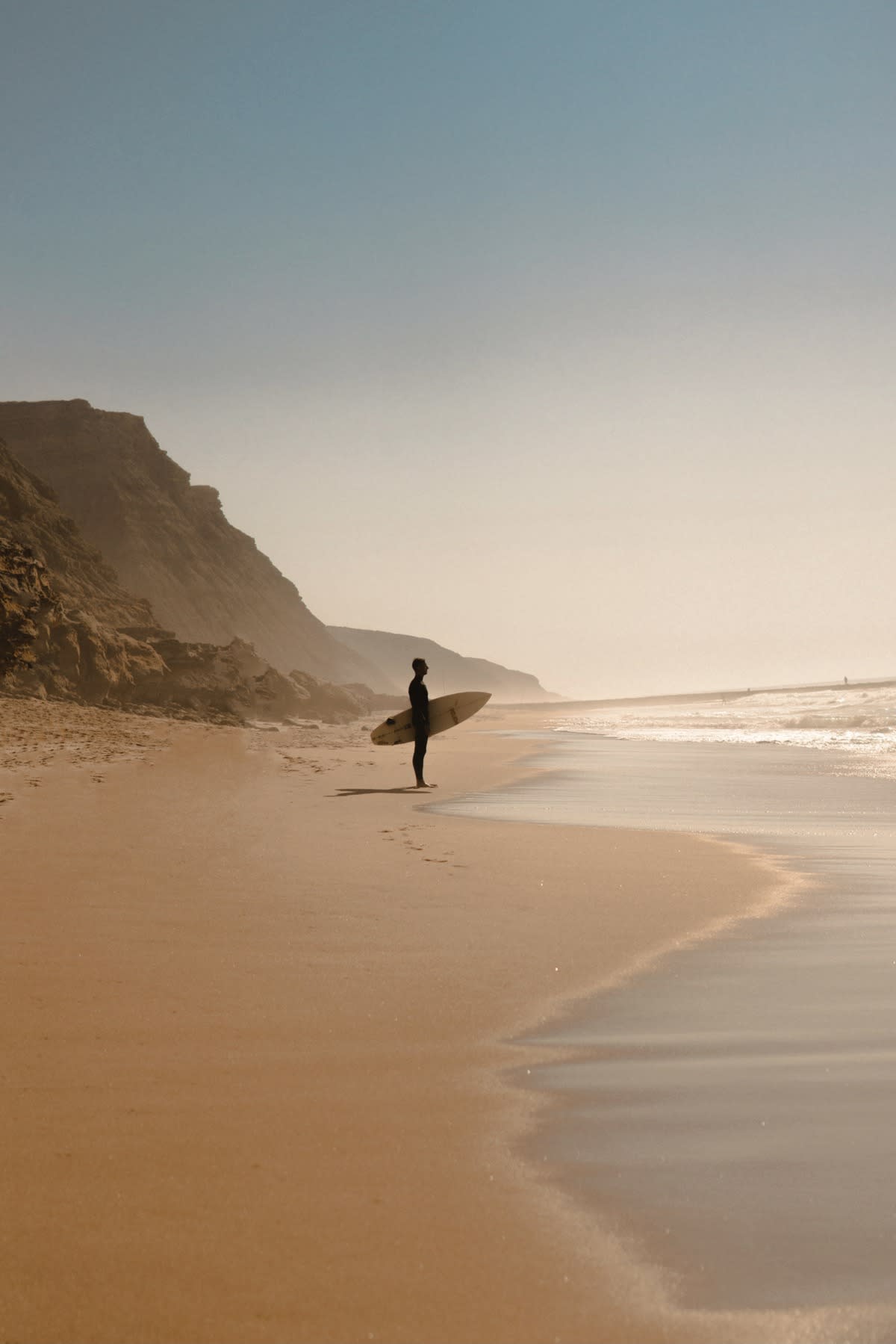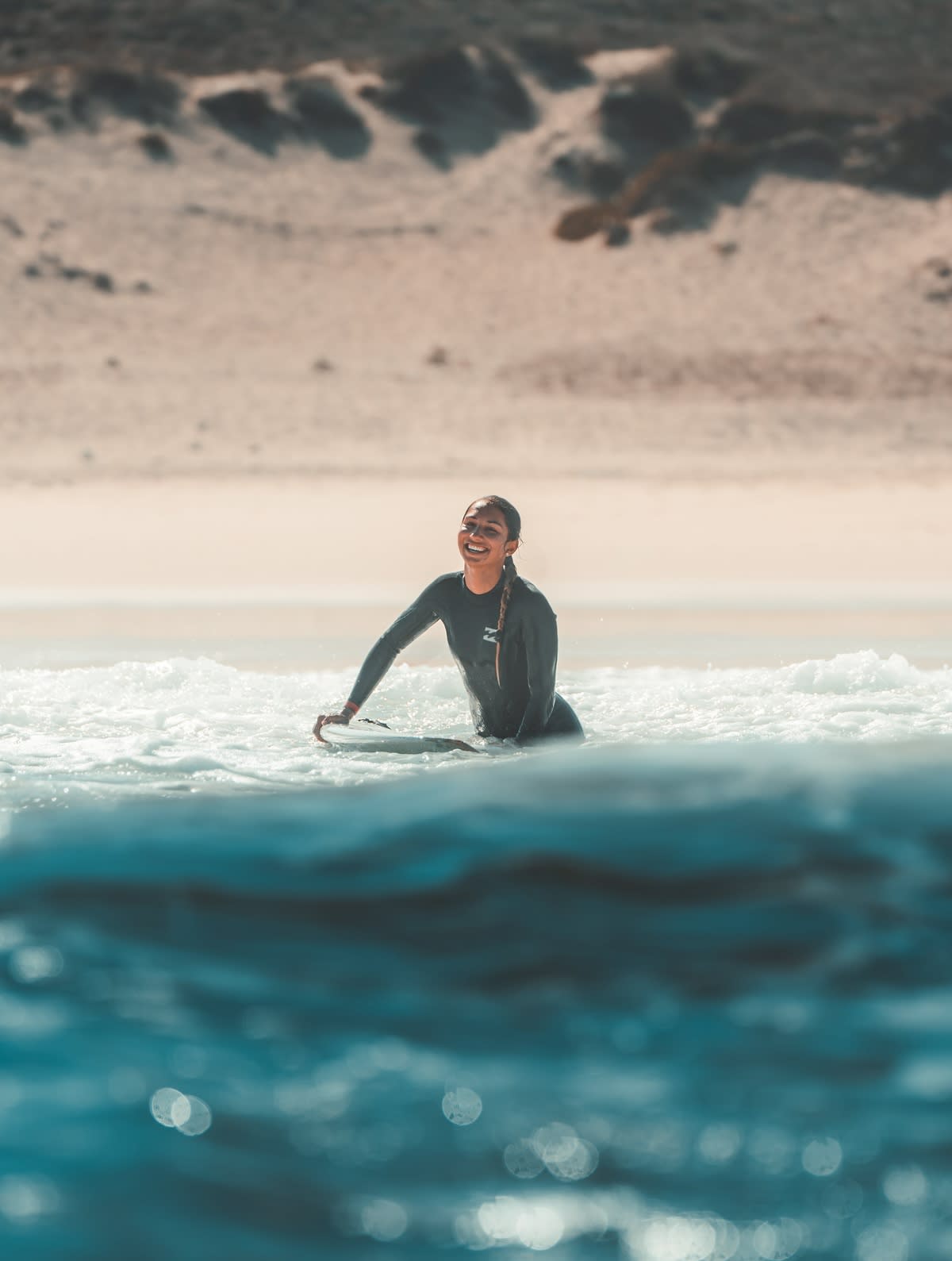
Top 10 things to know when you start surfing
June 30, 2025Starting to surf is more than grabbing a board and jumping into the water to catch some nice waves. There are surf etiquette rules to follow, safety aspects to think of and wave conditions to check. We list the top 10 tips every beginner surfer should know!
Let's rip off the bandaid shall we: surfing is hard. Some may even argue that it is one of the world's most difficult sports. It's not for lazybones. It is mentally and physically challenging, and mother earth is completely in charge of the daily conditions. The ocean is powerful and can be quite intimidating even for experienced surfers. Therefore It is important to get familiar with the ocean safety factors that will keep you, the ocean and everyone around you safe. Knowing what to do, and what to not do, will make you feel more confident in the water and you'll have more fun.
1. Practice your swimming ability
Don't put too much trust in your board for safety in the water. If you get separated from it for any reason you must be able to manage it on your own. Hence: you need to be a good enough swimmer. Swimming laps in a pool is a great way to practice, but keep in mind that the ocean is next level. Therefore it might be a good idea that you improve your ocean swimming skills too. That will make you better prepared if anything were to happen.
2. Know your limits

Remember: the ocean is stronger than you, no matter how often you hit the local gym or pool. So don’t paddle out in conditions that are too advanced for your level. Be gentle with yourself when you are starting to surf. We know that it can feel tempting to push yourself and advance quickly, but it is important that you listen to your body and your own limitations.
When you're feeling tired or unfocused it might be a good idea to head back to shore. The ocean isn't going anywhere, it will still be there for you when you come back for your next session.
3. Learning to surf takes time

Don't be discouraged if you don't manage to stand up on your board on your first surf lesson, or can't catch your own waves within a week. The learning process in surfing takes time. As previously said, surfing is a hard sport to get into. By knowing this you can have a realistic attitude about your progress, and the learning will be more enjoyable with less pressure. You'll advance in time, all you need to do is to stay consistent and practice, practice, practice!
4. Read surf reports to get familiar with the wave conditions
Doing a bit of planning before going out for a surf might be a good idea to know where and when to go. You can check the surf forecast on apps like Surfline and Windguru.
5. Know the ocean safety aspects
By simply knowing common things that can occur in the ocean, and what to do when it happens, you will feel safer and more comfortable. There are a few safety rules that are important to keep in mind to avoid danger for yourself and your fellow surfers in the water:
As a beginner, it's wise to avoid surf spots that are too crowded and only surf the spots your ability allows you to. You will catch more waves and have more fun.
Hitting yourself with your own board is a common way to get hurt in a wipeout. Therefore it's important to get as far away from your board as possible and protect your head with your arms when you fall.
Stay away from the impact zone. The impact zone is where the wave is the most powerful and is about to break, if you get caught here you can forcefully get dragged down towards the ocean floor. By paddling to the white water you can avoid that happening.
Avoid being too close to other surfers to lower the risk for collisions.
Pay close attention when your surf coach is demonstrating the emergency signals, you never know when you might need to use them.
When you paddle back to shore after a session, never paddle against the rip current. The rip is where you paddle out from the shore, not in. This current is strong and helps you on your way out. However, paddling back in the rip current will require a great amount of energy. Even advanced surfers can't fight the rips sometimes. But no need to panic if you get caught here, the rips are narrow (often not wider than 10-20 meters or around 30-65 feet) so by paddling out to the side, parallel to the shoreline, you can make a quick escape.
Never surf without a leash.
Find a spot on the beach to use as a reference point when you start your surf session, that makes it easy to see if the currents have pushed your position.
6. Stay calm
When you are a beginner the experience can be quite overwhelming (pun intended) and panic can creep in when a wave hits you and you get rag-dolled. As a beginner surfer, it's also easy to panic when getting caught in a rip, but if you just keep your calm everything will be alright. When you panic it's easier to lose your breath, which will make it scarier. Therefore you need to be able to stay calm. A good way of practising this beforehand is to do meditation or breathwork.
7. Follow the surf etiquette and follow the rules
How tempting it may feel, you can't jump into the water and do whatever you'd like. There are rules that you are expected to follow in the water to avoid collisions and other accidents. To avoid being the star of the next kook-collision video here are some of the golden rules to follow in the lineup:
Respect the priority rule and who has the right to the wave
Don't drop in on other surfers
Don't snake
Avoid chicken dives, aka don't throw your board away
Apologize when being wrong, be friendly and communicate
Making mistakes is a normal part of the learning curve. If your drop-in wasn't intentional, experienced surfers are usually able to tell. Use your common sense, learn the rules and be respectful with your fellow surfers in the water.
Check out this blog post for more surf etiquette and surf ethics.
8. Respect the locals and the local rules

A person with a long history of surfing an area is usually thought of as a local. Sometimes the locals have their own variations of surf rules in the area, and it's important to accept them. Depending on the vibe of the specific area, the local surfers might be more or less inviting to strangers. A simple thing to keep in mind when you go on a surf holiday is that you aren't home.
So take a step back and observe the local rules. Some of these surfers have surfed the areas since they were kids, or since their grandparents were kids. So it's not uncommon that they can be protective of it. If you follow the rules and are respectful, you will most likely get respect back. When disrespecting the locals and the rules, just takes out the fun of the experience (and makes it more dangerous too). And at the bottom line, we’re all just here for a good time.
9. Keep nature safe

Okay, so we covered how to handle yourself and others around you. Remember to also be respectful to the place where you're surfing. Don't litter on the beach, avoid using sunscreen that is harmful to the ocean and be gentle if you have the privilege to see animals in the water.
10. Start surfing with a surf school
Are the previous tips starting to feel a bit much to keep in mind? Don’t worry. If you start surfing with an experienced friend or a coach at a surf school they will help guide you through it all. Your coach knows how to keep you safe, which location to surf at and how to read the waves. You'll also learn the right technique right away. You will progress faster – and have more fun than going alone! Learning to surf with a surf school will also provide you with the opportunity to meet other beginners and make friends.
After all, the community is a major thing in surfing!
Stay safe and enjoy the ocean!
Now you know ten important tips to keep safe in the ocean. Want to know more? Check out this blog post about which board to choose and 19 other tips for beginner surfers.
A little extra: Big names and fun surfing facts
5 famous surfers every beginner should know about
1. Kelly Slater (USA): The greatest competitive surfer of all time, Slater has won 11 world titles and revolutionized modern surfing with his technique, style, and wave knowledge.
2. Stephanie Gilmore (Australia): A 8-time world champion, Gilmore is known for her smooth and stylish surfing, inspiring women worldwide to take up the sport.
3. Duke Kahanamoku (Hawaii, USA): Known as the "Father of Modern Surfing," Duke was an Olympic swimmer who helped spread surfing worldwide in the early 1900s.
4. Gerry Lopez (USA): Nicknamed "Mr. Pipeline," Lopez mastered the famous Banzai Pipeline in Hawaii and helped shape tube-riding as we know it today.
5. Bethany Hamilton (USA): After losing her arm in a shark attack at 13, she made an incredible comeback, becoming a pro surfer and inspiring millions with her determination.
3 fun facts about surfing
1. Surfing is one of the oldest sports in the world: The first recorded evidence of surfing dates back over 1,000 years to Polynesia, where it was a central part of their culture.
2. The longest wave ever ridden lasted over three hours: In 2011, surfer Gary Saavedra rode a river wave in Panama for an incredible 3 hours and 55 minutes!
3. The biggest measured wave ever surfed was over 90 feet: The current Guinness World Record for the biggest wave ever surfed is held by Sebastian Steudtner. He rode an enormous 93.7-foot (28.6 m) wave in Nazaré on February 24, 2024.
NEWSLETTER
Stay up to date, sign up for our newsletter

Beatrice Lindfors
About the author: My name is Beatrice, but Bea for short, and I’ve been a writer and content creator for Lapoint since 2022. My life revolves around my laptop and backpack as I travel the world (always with a stop in Ericeira; the camp vibe there and the Portuguese sunset have my heart). Life goal? Visit every country.
Obsession? The Sri Lanka waves, the Atlantic Ocean and tracking down the best coffee –whichever my current location is.

